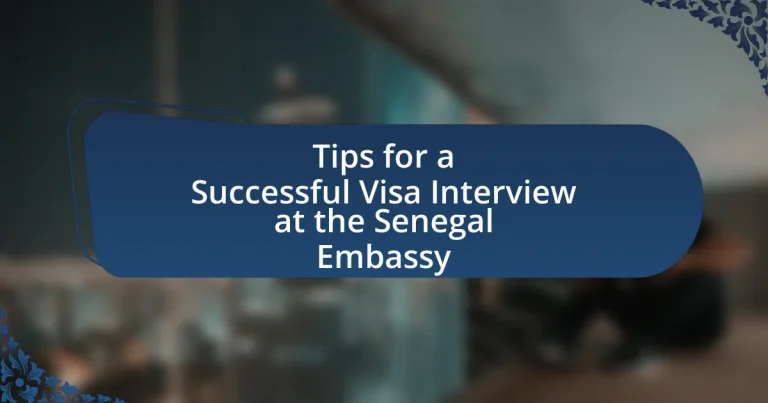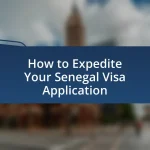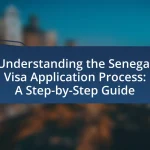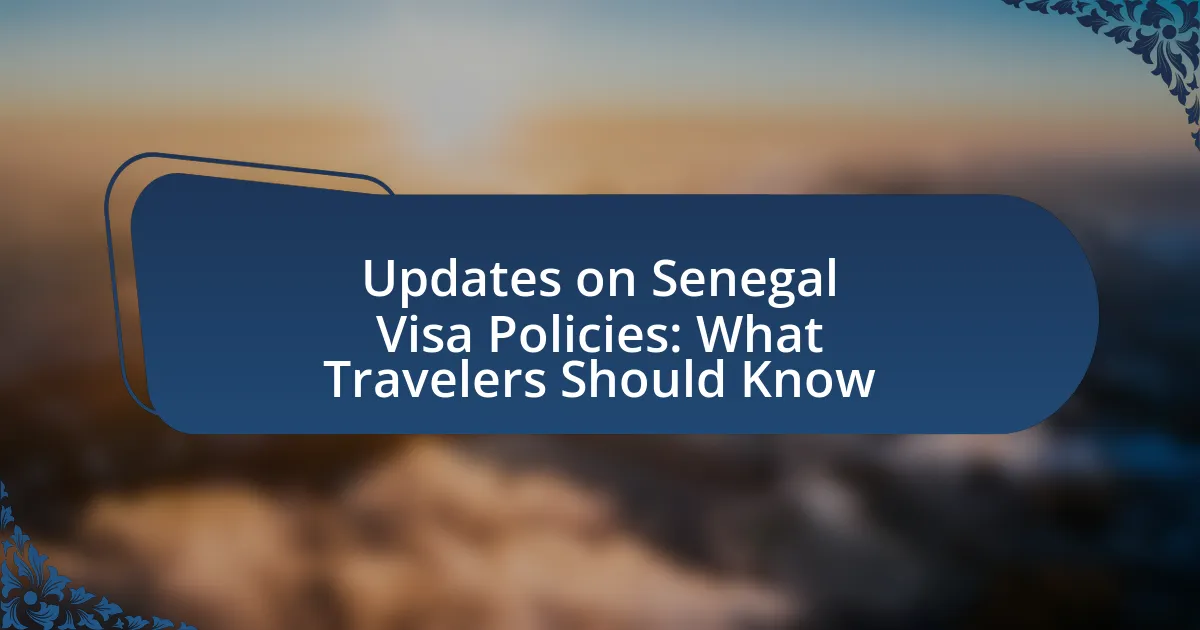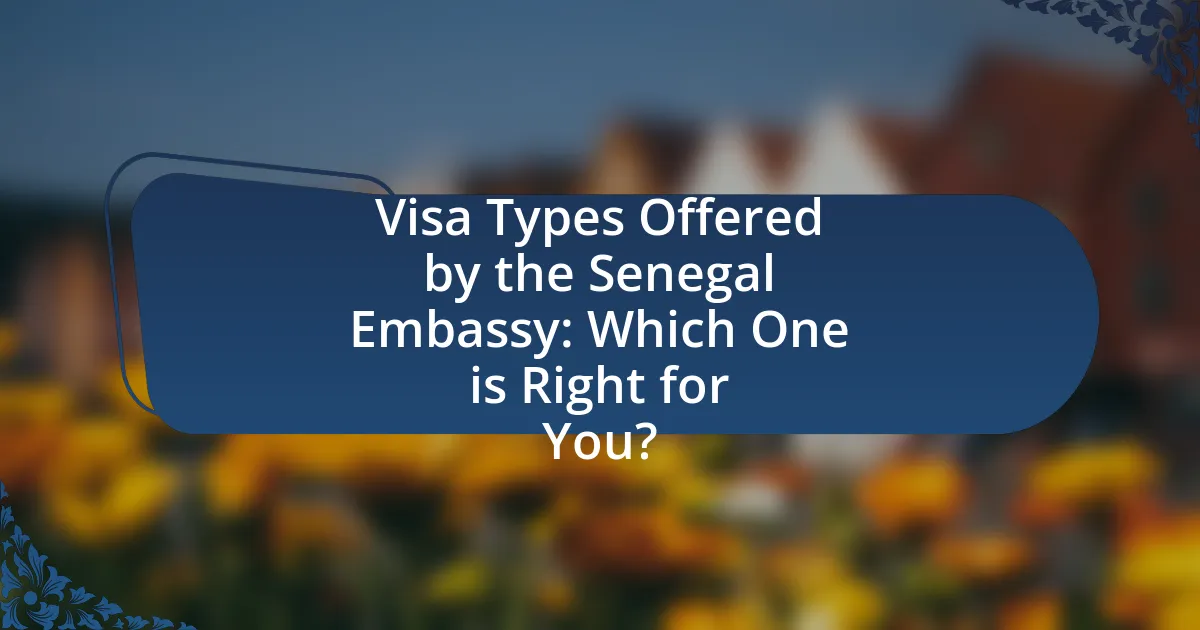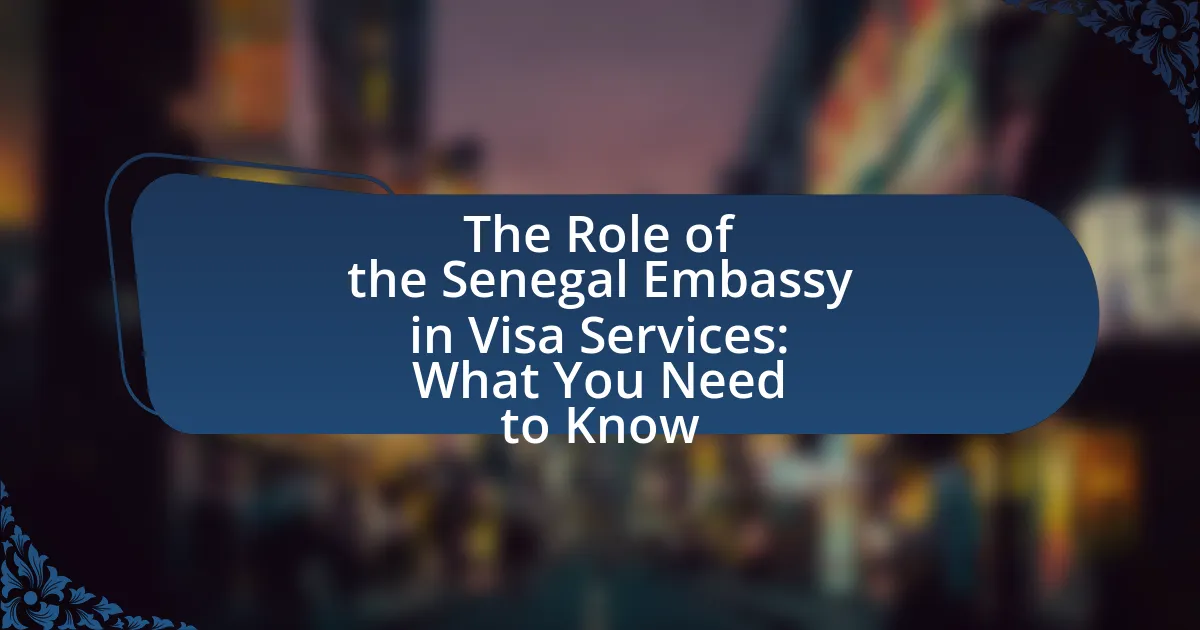The article focuses on essential tips for a successful visa interview at the Senegal Embassy. It outlines key components such as thorough preparation, clear documentation, and effective communication, which are crucial for applicants. The article details how to prepare for the interview, including required documents, appropriate attire, and common questions asked. It also emphasizes the importance of practice, time management, and avoiding common pitfalls that could negatively impact the visa application. Additionally, it provides guidance on follow-up actions post-interview and strategies for addressing potential visa denials.
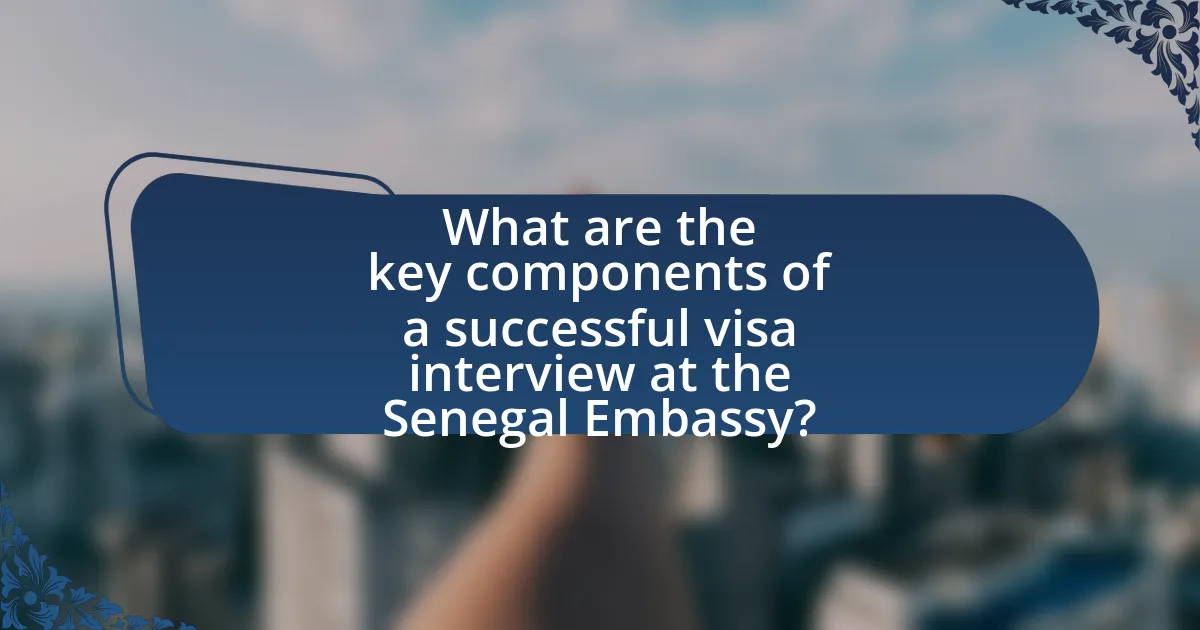
What are the key components of a successful visa interview at the Senegal Embassy?
The key components of a successful visa interview at the Senegal Embassy include thorough preparation, clear documentation, and effective communication. Preparation involves understanding the visa requirements and practicing potential interview questions. Clear documentation means providing all necessary paperwork, such as a valid passport, application forms, and financial statements, which demonstrate the ability to support oneself during the stay. Effective communication entails answering questions confidently and honestly, as well as maintaining a respectful demeanor throughout the interview process. These components are essential for increasing the likelihood of a positive outcome in the visa application process.
How can applicants prepare for their visa interview?
Applicants can prepare for their visa interview by thoroughly reviewing their application and supporting documents. This includes ensuring that all information is accurate and consistent, as discrepancies can lead to delays or denials. Additionally, applicants should practice common interview questions, such as their travel purpose and financial stability, to articulate their intentions clearly. Familiarity with the Senegal Embassy’s specific requirements and procedures is crucial, as it helps applicants understand what to expect during the interview process. Preparing answers that demonstrate ties to their home country, such as employment or family connections, can also strengthen their case.
What documents are required for the visa interview?
The documents required for the visa interview at the Senegal Embassy typically include a valid passport, a completed visa application form, a recent passport-sized photograph, proof of travel itinerary, and financial statements demonstrating sufficient funds. Additionally, applicants may need to provide an invitation letter if visiting family or friends, or a hotel reservation if staying at a hotel. These requirements are established to ensure that applicants meet the necessary criteria for visa issuance and to facilitate the processing of their applications.
How should applicants dress for the interview?
Applicants should dress in formal business attire for the interview. This typically includes a suit and tie for men, and a professional dress or suit for women. Dressing formally demonstrates respect for the interview process and reflects professionalism, which is crucial in a visa interview context. Research indicates that first impressions are significantly influenced by appearance, with studies showing that well-dressed individuals are perceived as more competent and trustworthy. Therefore, adhering to formal dress standards can positively impact the outcome of the interview.
What common questions are asked during the visa interview?
Common questions asked during a visa interview include inquiries about the purpose of travel, financial stability, ties to the home country, and previous travel history. Specifically, applicants may be asked why they are visiting Senegal, how long they plan to stay, and how they will support themselves financially during their visit. Additionally, interviewers often seek to understand the applicant’s connections to their home country, such as family, employment, or property ownership, to assess the likelihood of returning after the visit. These questions are designed to evaluate the applicant’s intentions and eligibility for the visa.
What personal information is typically requested?
Personal information typically requested during a visa interview at the Senegal Embassy includes the applicant’s full name, date of birth, nationality, passport number, and contact information. This information is essential for verifying identity and eligibility for the visa application. Additionally, applicants may be asked for details regarding their employment, financial status, travel history, and purpose of visit, which help the embassy assess the applicant’s intentions and ties to their home country.
How can applicants effectively answer questions about their travel plans?
Applicants can effectively answer questions about their travel plans by providing clear, detailed, and honest information regarding their itinerary, purpose of travel, and accommodations. For instance, applicants should outline specific dates of travel, destinations within Senegal, and activities planned, which demonstrates preparedness and intention. Additionally, presenting supporting documents such as flight itineraries, hotel reservations, and travel insurance can substantiate their claims and enhance credibility. This approach aligns with the expectations of visa interviewers, who seek to verify the legitimacy of travel intentions.
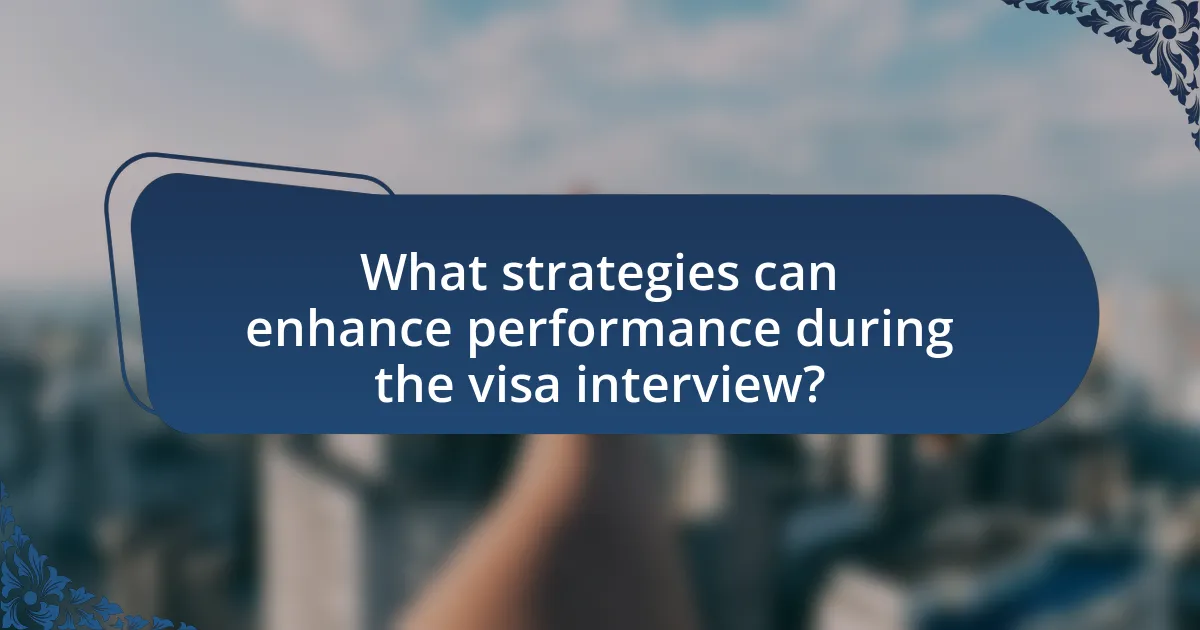
What strategies can enhance performance during the visa interview?
To enhance performance during the visa interview, applicants should prepare thoroughly by researching the visa requirements and practicing common interview questions. Preparation includes understanding the specific documents needed, such as proof of financial stability and ties to the home country, which demonstrate the intent to return after the visit. Additionally, practicing responses to typical questions can help applicants articulate their intentions clearly and confidently. Studies show that well-prepared candidates tend to perform better, as they can provide concise and relevant answers, reducing the likelihood of misunderstandings or miscommunication during the interview.
How can applicants build confidence before the interview?
Applicants can build confidence before the interview by thoroughly preparing and practicing their responses to common interview questions. Preparation involves researching the Senegal Embassy’s visa requirements and understanding the specific details of their application. Practicing answers aloud can help applicants articulate their thoughts clearly and reduce anxiety. Studies show that individuals who engage in mock interviews report higher confidence levels and better performance during actual interviews.
What role does practice play in interview preparation?
Practice plays a crucial role in interview preparation by enhancing a candidate’s confidence and performance. Engaging in mock interviews allows individuals to familiarize themselves with common questions and refine their responses, which can lead to improved articulation and clarity during the actual interview. Research indicates that candidates who practice are more likely to exhibit reduced anxiety and better body language, both of which are essential for making a positive impression. For instance, a study published in the Journal of Applied Psychology found that individuals who participated in structured practice sessions performed significantly better in interviews compared to those who did not. This evidence underscores the importance of practice as a key component in preparing effectively for interviews.
How can mock interviews help applicants?
Mock interviews help applicants by providing a realistic simulation of the actual interview process, allowing them to practice their responses and improve their performance. This practice helps applicants identify their strengths and weaknesses, enabling them to refine their answers and reduce anxiety. Research indicates that candidates who engage in mock interviews often experience a 30% increase in confidence and preparedness, which can significantly enhance their chances of success in real interviews.
What should applicants do on the day of the interview?
Applicants should arrive at the Senegal Embassy on the day of the interview well-prepared and on time. This includes bringing all required documents, such as a valid passport, completed visa application form, and any supporting materials like financial statements or invitation letters. Arriving early allows applicants to manage any unforeseen delays and reduces stress, which is crucial for presenting themselves confidently. Additionally, applicants should dress professionally to make a positive impression, as first impressions can significantly influence the interview outcome.
How can applicants manage their time effectively on the interview day?
Applicants can manage their time effectively on the interview day by creating a detailed schedule that includes arrival time, interview time, and breaks. This structured approach allows applicants to allocate sufficient time for each activity, reducing stress and ensuring they are prepared. For instance, arriving at least 30 minutes early can provide a buffer for unexpected delays, while setting aside time to review necessary documents before the interview can enhance confidence and performance. Studies show that time management significantly impacts interview outcomes, as candidates who are well-prepared and punctual tend to make a better impression on interviewers.
What should applicants remember to bring to the interview?
Applicants should remember to bring essential documents to the interview, including a valid passport, visa application form, and supporting documents such as financial statements and proof of accommodation. These items are crucial as they provide verification of identity, purpose of travel, and financial stability, which are key factors in the visa approval process. Having these documents organized and readily available demonstrates preparedness and can positively influence the interview outcome.
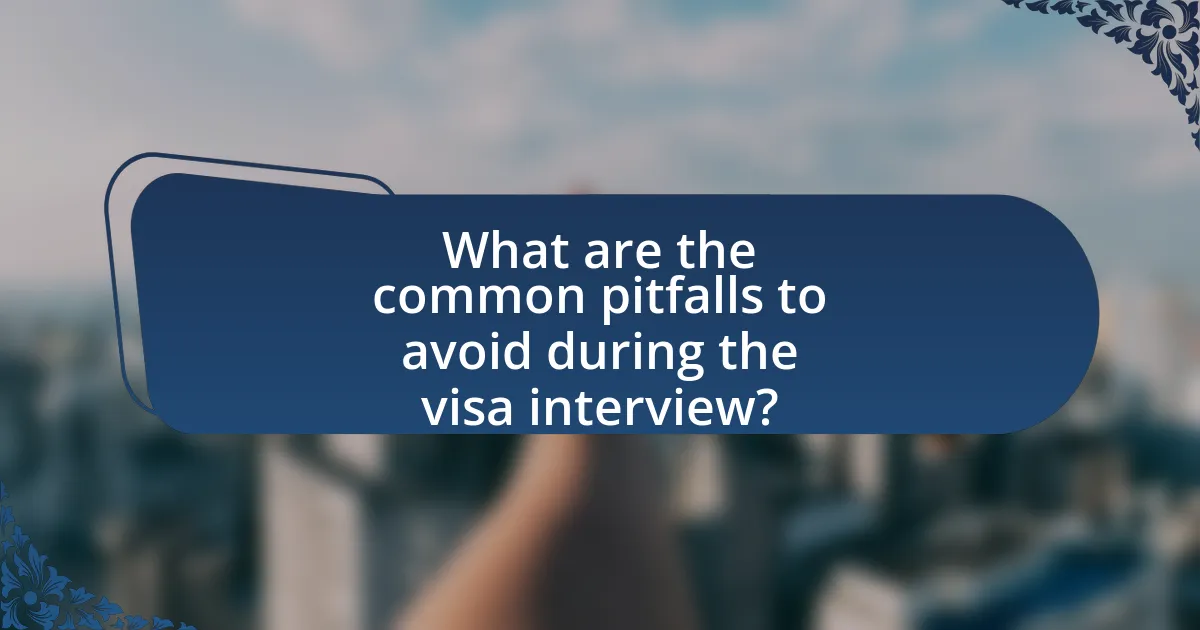
What are the common pitfalls to avoid during the visa interview?
Common pitfalls to avoid during the visa interview include providing inconsistent information, failing to prepare for questions, and not demonstrating sufficient ties to the home country. Inconsistent information can lead to doubts about the applicant’s credibility, as visa officers rely on accurate and truthful responses to assess eligibility. Failing to prepare for common questions, such as the purpose of travel or financial stability, can result in unclear or unsatisfactory answers, which may negatively impact the decision. Additionally, not demonstrating strong ties to the home country, such as employment, family, or property, can raise concerns about the applicant’s intention to return after their visit, leading to potential visa denial.
What mistakes can negatively impact the visa application?
Common mistakes that can negatively impact a visa application include providing incomplete or inaccurate information, failing to submit required documents, and not demonstrating sufficient ties to the home country. Incomplete or inaccurate information can lead to delays or denials, as visa officers rely on accurate data to assess eligibility. Failing to submit required documents, such as financial statements or proof of accommodation, can result in an application being deemed insufficient. Additionally, not demonstrating sufficient ties to the home country, such as employment or family connections, raises concerns about the applicant’s intent to return, which can lead to rejection.
How can applicants avoid providing inconsistent information?
Applicants can avoid providing inconsistent information by thoroughly reviewing their application materials and ensuring all details align across documents. Consistency in personal information, such as names, dates, and addresses, is crucial; discrepancies can raise red flags during the visa interview process. Additionally, applicants should prepare for potential questions by practicing their responses, which helps reinforce accurate and uniform information. Research indicates that applicants who engage in mock interviews report higher confidence and clarity, leading to fewer inconsistencies.
What should applicants refrain from discussing during the interview?
Applicants should refrain from discussing personal or sensitive topics such as religion, politics, or financial status during the interview. Engaging in these discussions can lead to misunderstandings or biases that may negatively impact the outcome of the visa application. For instance, interviews are typically focused on the applicant’s travel intentions and qualifications, and straying into controversial subjects can detract from the main purpose of the meeting.
What are the best practices for following up after the interview?
The best practices for following up after the interview include sending a thank-you email within 24 hours, expressing gratitude for the opportunity, reiterating interest in the position, and highlighting key points discussed during the interview. This approach demonstrates professionalism and reinforces the candidate’s enthusiasm for the role. Research indicates that timely follow-ups can positively influence hiring decisions, as 80% of employers appreciate candidates who take the initiative to follow up (Source: CareerBuilder, 2017).
How can applicants inquire about their visa status post-interview?
Applicants can inquire about their visa status post-interview by contacting the Senegal Embassy directly through their official communication channels. This typically includes calling the embassy’s visa section or sending an email to the designated address provided on their official website. The embassy usually provides specific instructions on how to check visa status, which may include providing personal details such as the applicant’s name, date of birth, and application reference number. This method is reliable as it allows applicants to receive the most accurate and up-to-date information regarding their visa application.
What should applicants do if their visa is denied?
If an applicant’s visa is denied, they should first carefully review the denial letter to understand the specific reasons for the rejection. This letter typically outlines the grounds for denial, which may include insufficient documentation, failure to meet eligibility criteria, or concerns about the applicant’s intent to return to their home country. After identifying the reasons, the applicant can address these issues by gathering additional evidence or documentation that supports their case.
Next, applicants have the option to appeal the decision or reapply for the visa, ensuring that they rectify the issues highlighted in the denial. It is crucial to follow the specific procedures outlined by the Senegal Embassy for appeals or reapplications, as these processes can vary. Seeking assistance from an immigration attorney or a qualified consultant can also provide valuable guidance in navigating the next steps effectively.
What practical tips can ensure a successful visa interview experience?
To ensure a successful visa interview experience, applicants should prepare thoroughly by gathering all required documents, practicing common interview questions, and presenting themselves professionally. Thorough preparation includes having a complete set of documents such as a valid passport, visa application form, financial statements, and any additional paperwork specific to the visa type. Practicing answers to common questions, such as the purpose of travel and ties to the home country, helps build confidence and clarity during the interview. Presenting oneself professionally, including dressing appropriately and arriving on time, demonstrates respect for the process and can positively influence the interviewer’s perception. These strategies are supported by the fact that well-prepared applicants tend to have higher approval rates, as indicated by various studies on visa application outcomes.
